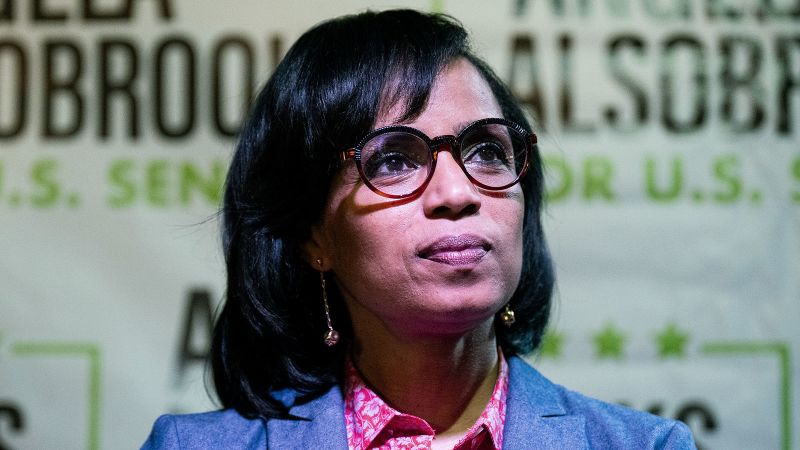Angela Alsobrooks will win Maryland’s Democratic nomination for US Senate, CNN projects, advancing her potentially history-making candidacy to the competitive general election with implications for control of the chamber next year.
The Prince George’s County executive’s victory is a stunning defeat over three-term Rep. David Trone, who loaned his campaign at least $61.77 million, breaking the record for self-funding a Senate primary campaign. She’ll face Republican former Gov. Larry Hogan, whose entrance into the race earlier this year shook up the Senate battlefield. Hogan will easily win his primary Tuesday, CNN projects.
With Republicans already poised to flip a Senate seat in West Virginia, the party only needs to pick up one or two more seats, depending on who wins the White House, to secure the majority. That’s raised the stakes for Maryland, where the candidacy of the popular former governor is likely to make the race to succeed retiring Democratic Sen. Ben Cardin more competitive than expected in a state that Joe Biden carried in 2020 by one of the largest margins in the country.
While Trone, the co-owner of Total Wine & More, had an enormous financial advantage – outspending Alsobrooks on the airwaves about $47.5 million to $4 million – she had powerful endorsements from Maryland’s elected officials, including Gov. Wes Moore and every other member of the congressional delegation except for one House member and Cardin, who remained neutral.
Alsobrooks is vying to be only the third Black woman elected to the Senate – and the first Black senator from Maryland. (The one Black woman currently serving — California’s Laphonza Butler — was appointed and isn’t running to stay beyond this year.) That history-making potential resonated with many of her supporters, who also wanted to see a woman in Maryland’s 10-person congressional delegation, which is currently all male.
Besides touting her record in Prince George’s County, Alsobrooks and her allies pointed to her profile to make the case that she was the better general election candidate. She argued that she was a stronger messenger on abortion rights, for example, and frequently highlighted her opponent’s past contributions to Republicans who have since signed abortion restrictions. (Trone has argued that those were business expenses while touting the millions he’s donated to Democrats.) EMILY’s List also made a $2.65 million investment highlighting Trone’s donations to Republicans on air.
“Electing women is not just good for Maryland,” Alsobrooks told a crowd of supporters at a recent get-out-the-vote event in Silver Spring. “It’s good for America to make sure that the voices of women are included at these tables as we’re making important decisions.”
Trone had his own endorsements from House Democratic leadership and a string of congressional surrogates, including California Rep. Adam Schiff, who joined him on the trail in the closing days of the race. He also touted the backing of some local leaders from Alsobrooks’ backyard, specifically Black women, some of whom appeared in ads attacking the county executive.
But some of Trone’s comments during the primary earned criticism from Black female leaders. He apologized for using a racial slur during a congressional hearing, saying that he had misspoken. And even after his campaign edited out a comment from an ad in which a local politician suggested Alsobrooks would need “training wheels” in the Senate, Trone made a similar remark in an interview with a local NBC affiliate – later denying to CNN he had said those words.
More than 750 Black female leaders condemned Trone’s attack ads, calling out “tones of misogyny and racism.” They wrote in a letter: “This attempt to undermine Ms. Alsobrooks’ candidacy is deeply troubling and emblematic of the obstacles Black women face in political spheres.”
Trone had made his ability to self-fund – and the independence he said that gives him from “special interests” – a crucial part of his electability pitch, with his closing ads laying out the threat Hogan poses. He wasn’t shy about arguing that he could take pressure off national Democrats to spend in normally deep-blue Maryland to focus on defending vulnerable incumbents around the country.
But although Alsobrooks lacks Trone’s personal resources, she raised nearly $7.8 million by the end of the pre-primary reporting period on April 24.
“Trone obviously has the money to self-fund. Money isn’t really an issue with him,” said Mileah Kromer, who oversees the Goucher College Poll, said before the primary. “But the historic nature of Alsobooks’ candidacy should she win — I would expect that there’ll be a lot of outside money that immediately comes in from national organizations to support her.”
Read the full article here
